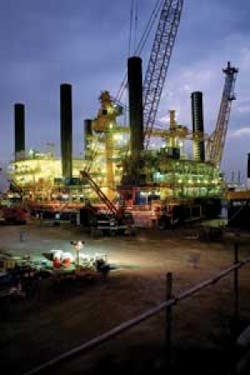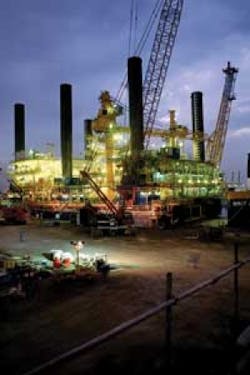Asia Pacific is rich in new opportunities
Richard Bailey
GL Noble Denton
Natural gas is one of the most important considerations for operators seeking to exploit opportunities in the Asia Pacific region. Asia is not just one of the largest consumers of natural gas; it is also considered the global hub for LNG design and component construction.
In the global context of rising energy demand, the Economist Intelligence Unit report "Deep water ahead?", sponsored by GL Noble Denton, refers to natural gas as a key industry "game changer," seen as an affordable and relatively low-carbon source of energy also suitable for use in electricity generation. Its popularity has risen as Asia has sought to increase its supply options. While oversupply from US shale gas production and a surfeit of LNG (particularly from Qatar) has swamped the market of late, the report suggests that demand from Asia is expected to eat away at these reserves, with the impact expected to be a modest rise in natural gas prices.
A lot of drilling and production activity conducted through moonpools such as this is pushing the offshore Asia/Pacific region to the forefront of both production and consumption. Natural gas and LNG projects are among the largest in the world.
The earthquake and subsequent tsunami in Japan this past March severely impacted the country's energy sector, resulting in the need to import unprecedented quantities of LNG in the long term to offset the loss of nuclear power capacity. Already considered one of the world's largest importers of LNG, demand is expected to rise further as a result. Much of the extra fuel is expected to come from Qatar, one of the world's largest LNG producers, while other key suppliers include Russia (the island of Sakhalin, north of Japan), with important supplies also being generated from East Siberia and the Caspian region.
Workforce supply challenges
With LNG activity levels at an all-time high, a key challenge to the oil and gas industry in Asia is the provision of staff to supply growing demand for energy. While there is an abundant supply of potential workforce candidates in the region, a lack of technical experience has proven a barrier to operations.
Some countries have started to address this challenge. Indonesia, for example, has openly enlisted in foreign technical expertise in order to maximize the potential results of technically challenging developments, and the country is recognized for having a well-balanced approach to international involvement – more so than other Asia Pacific countries. As with many developing regions, there is a high demand for project management experience. Malaysia in particular is home to several major LNG engineering projects, with a strong desire to attract technical expertise from around the world.
Meanwhile, the slowdown of activity in the Middle East as a result of political unrest has seen many Australian residents return home for employment, satisfying the high demand in this region for LNG, project engineering, and quality, procurement and construction personnel.
Rise of Asian national oil companies
The rise of national oil companies (NOCs) has been a topic for discussion in the global oil industry for more than a decade. The Economist Intelligence Unit's report found that rising energy prices and the growing scarcity of easy-to-access development opportunities have delivered greater advantages to state-owned companies over international oil company (IOC).
In Asia, NOCs have emerged with a mandate to acquire steady supplies of oil and gas to ensure uninterrupted economic expansion, and IOC chiefs have identified this competition as one of the biggest corporate challenges in gaining access to new prospects.
Many IOCs understand that their relationships with NOCs are increasingly important, with 34% of survey respondents expecting that NOC policies towards IOCs will be either "somewhat" or "significantly" more restrictive across the remainder of 2011.
NOCs themselves, however, are facing new forms of competition too. The new breed of Asian internationalizing NOCs – or INOCs – has emerged as competitors over the past two years. Companies such as PetroChina and Malaysia's Petronas, for example, boast healthy cash flows, self-sufficient and integrated operations, and already function similarly to IOCs.
The report also acknowledged that in some cases, IOCs and Asian NOCs are collaborating in key resource opportunities. China National Petroleum Corp. (CNPC) and Petronas, for example, both won substantial stakes in five fields in Iraq's first two licensing rounds, securing recoverable crude resources estimated at 13 Bbbl. The two INOCs joined with BP and Shell, respectively, in Iraq to form formidable IOC-INOC partnerships that represent a potentially seismic change in the relationships between resource holders and foreign oil companies. For instance, CNPC's exposure to its BP partnership will allow it to develop its own technical skills. The report said these new market entrants have created consternation for NOCs and IOCs alike.
Australia – The land of opportunity
The scale of projects in Australia in terms of capex could run into tens of billions of dollars. Significant investment has been made into exploration offshore northwest Australia in particular, where a number of gas discoveries have been made in recent years.
Chevron, the company behind the development of the Wheatstone project, is extremely active in the region. A founding partner in the North West Shelf Venture, the company has exported LNG to customers in the Asia/Pacific region for about 20 years and supplied natural gas to Western Australia for 25 years. Chevron is also leading development of the Gorgon Project, Australia's largest single resource venture, with an expected economic life of more than 40 years from the time of start-up (scheduled for 2014).
Australia is also considered a growth center by Shell. The company is developing large gas resources, while maintaining a substantial exploration portfolio off the coasts of Western Australia and Northern Territory.
As the full-equity holder and operator of the WA-371-P permit, an area covering around 1,000 sq km (386 sq mi) in the Browse basin, Shell discovered the Prelude gas field in 2007 and the Concerto gas field in 2009. Between them, the fields have around 3 tcf of liquids-rich gas.
Tokyo-headquartered INPEX Corp. has also recognized the huge potential on offer in the Australasian region, working with joint venture partner Total to develop and explore the Ichthys field in the Browse basin offshore Western Australia. The field has the potential to be a world-class gas project, with the expectation of producing more than 8 MM tons (8 MM metric tons) of LNG and 1.76 MM tons (1.6 MM metric tons) of PG per annum, with 100,000 b/d of condensate.
An FPSO will be used to develop the field, with condensate transferred to a nearby FPSO via a subsurface pipeline. There it will be treated and transferred to offtake tankers for export. Natural gas will be directed through export pipeline to onshore facilities for processing into LNG and LPG. A massive scale project, the mooring chain alone will take two years of the world's production.
GL Noble Denton established a presence in Australia in July 2010 and by the end of the year had worked across half of Australia's rigs. Its most recent contract is to work with the Queensland Curtis Liquefied Natural Gas (QGC) project, which is expected to supply more than 13 MM tons/yr (12 MM metric tons/yr) of LNG through the development of three LNG trains on Curtis Island. Gas will be supplied to the trains through a 500 km (311 mi) pipeline from the Surat basin.
The contract will see GL Noble Denton provide quality assurance oversight for the pipeline construction portion of the project, including on-site support to QGC to co-ordinate inspections.
With the rapid rate of development, labor availability is a critical. Quick to recognize this however, the Australian government has developed a range of training and re-skilling programs to bring expatriate workers back to the region.
Conclusion
There are many uncertainties for oil and gas worldwide, influenced by the scale and cost of gas developments, the rate in growth of demand from China, the burgeoning opportunities in Australasia, the continued skills shortage, and of course the risk of geopolitical conflict and natural disasters.
The growing importance of natural gas as a major energy source is being demonstrated by the amount of investment devoted to the sector across the globe, with increasing demand leading to new expansion and exploration projects around the world.
Meanwhile, Australasia and countries across the APAC region are increasingly important to the supply and demand of oil and gas worldwide. There is the expectation that the traditional global balance in activity will shift from Europe and North America to these emerging regions, where governments and state-controlled companies will play a major role in future activity.
These are all events that can influence activity and trends within the sector and, with plenty of exploration and development in the pipeline it remains to be seen the exact role that these regions will play going forward.
Deepwater ahead?
The oil and gas industry has experienced a period of unprecedented volatility in recent years, with record prices followed by a crash and subsequent recovery. High oil prices have led to a rise in exploration and production activity across the world, with the Asia Pacific region identified as an emerging opportunity for the energy sector, both in terms of demand and supply.
In January 2010, GL Noble Denton, an independent technical advisor to the oil and gas industry, commissioned the Economist Intelligence Unit to research and publish a report that provided a unique view of the challenges that those working in the sector expected to face across 2011 and beyond.
Nearly 200 senior industry executives were questioned in order to provide insight and commentary as part of the report, "Deep Water Ahead? The outlook for the oil and gas industry in 2011."
Those surveyed said they believed the greatest opportunities would be in the emerging East, with the largest proportion of respondents (32%) identifying Southeast Asia as the most significant region. That proportion rose to 58% when combined with China and the Far East.
Australasia, too, is identified as a burgeoning region in terms of opportunities. The rate of development in Australia's upstream sector is expected to grow significantly over the next 15 to 20 years; the country is anticipated to be the second largest exporter of LNG by 2015. Currently, Australia's Top 10 projects total more than £100 billion ($162 billion) of capital expenditure.
Large-scale projects like Gorgon, Wheatstone, and Ichthys are worth tens of billions of dollars. They have either already been granted environmental approval, or are expected to receive it soon.
These emerging markets underpin oil demand, boost confidence, and enable oil prices and capex to remain high. Recognizing the region's potential, GL Noble Denton has already invested in a broad presence across Asia Pacific, with offices in China, Korea, Southeast Asia (Malaysia, Thailand, Vietnam, Brunei, Indonesia, and the Philippines), and Australia.
This confidence in the sector was also highlighted by the Economist Intelligence Unit report, with the majority of survey respondents either "highly" or "somewhat" confident (76%) about their companies' business outlook for 2011. This compares with just 8% who described themselves as "highly" or "somewhat" pessimistic. And with the strongest demand coming from the East, it is no surprise that companies believe that their revenue growth will be increasingly focused on opportunities in the Asia Pacific region.
The full GL Noble Denton-sponsored Economist Intelligence Unit report "Deep water ahead?" can be found at athttp://www.gl-nobledenton.com/en/eiu-register.php.
The author
Richard Bailey is executive vice president Asia Pacific for GL Noble Denton.
Offshore Articles Archives
View Oil and Gas Articles on PennEnergy.com

